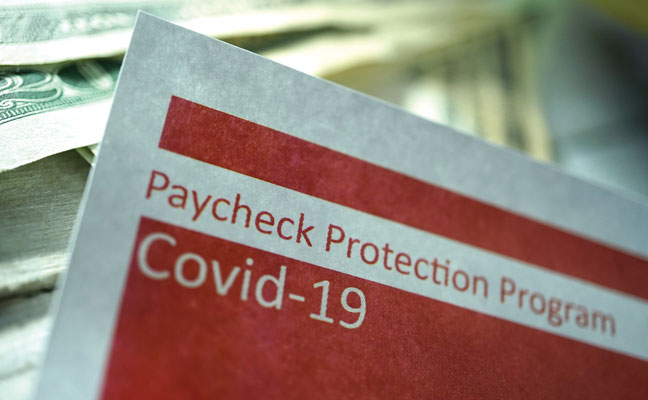
PHOTO: KAMELEON007/ISTOCK / GETTY IMAGES PLUS/GETTY IMAGES
Editor’s Note: While this column appears in our November issue, Dan has since posted some updates to this topic on his website at PCOBookkeepers.com.
As I have been advising friends and clients, the Paycheck Protection Program (PPP) was passed and implemented by the U.S. government in haste, leading to challenges in execution.
While we all are thankful the government sprang into action and made a large amount of money available to small business, there are many ambiguities and challenges that have been created by the rules as they currently are interpreted. Among the issues is the taxability of the PPP forgivable loan.
LOAN FORGIVENESS AND TAXABLE INCOME
Borrowers are not subject to tax on their receipt of PPP loan proceeds because there is an obligation to repay the loan. Basically, if you borrow money that needs to be paid back, this is not taxable income. However, if the loan covered expenses such as payroll, rent, utilities and interest payments within a specified time (either eight weeks or 24 weeks), the business can apply to have the loan forgiven.
When all or part of a loan is forgiven, this gives rise to cancellation of debt (COD) income. COD income generally is includible in gross income because a taxpayer has been released from the obligation to repay, which increases (or does not decrease) existing funds. This principle would have applied to loan forgiveness under a PPP loan, but Section 1106(i) of the Coronavirus Aid, Relief, and Economic Security (CARES) Act states that the amount of loan forgiveness under a PPP loan is excluded from gross income.
However, the IRS then issued Notice 2020-32, which states that expenses associated with tax-free income are nondeductible. This guidance was consistent with historic IRS guidance regarding nontaxable income and related expenses, but has the effect of essentially reversing the tax-free benefit of the exclusion on the loan forgiveness. Unless Congress acts to reverse this regulation, which as of press time is not a priority, the amount of the disallowed expenses will essentially increase your taxable income — thereby increasing your taxes as though the PPP were taxable.
The key challenges are the timing of income recognition and deductibility of expenses as forgiveness applications are now being accepted. Banks have 60 days to review, and the Small Business Administration (SBA) has up to 90 days for its review. So most likely, the forgiveness notification for most won’t even be effective until early next year.
WHAT THIS MEANS FOR PPP PARTICIPANTS
The question is whether the forgiveness of the loan increases taxable income in 2020, when the proceeds are received and expenses are incurred, or in 2021, when the borrower receives confirmation his or her loan is forgiven. If you file your 2020 tax return before forgiveness is determined, should you deduct the expenses related to the use of the PPP funds? Or do you disallow the deduction, assuming the loan ultimately will be forgiven? If you deduct the expenses, what happens when the loan is forgiven?
At this point, these questions are still unanswered. Taxpayers should consider filing extensions for their 2020 tax returns to hold off on filing until forgiveness is determined — or Congress acts to address this issue.
It’s also important to note you may have to file a tax return before you know the ultimate forgiveness amount, depending on the timeline of your application and other factors, including your fiscal year-end. In this case, there’s limited guidance available on the tax return reporting requirements.
If you’re able to apply for and receive forgiveness in 2020, the answer on timing is simple: You have nontaxable income and nondeductible expenses in the same period for federal purposes, based on current guidance, and should recognize the income and related tax for 2020. If Congress acts to reverse the IRS regulation, you will be able to amend your 2020 tax return and receive a refund in the future.
GORDON owns PCO Bookkeepers, an accounting and consulting firm that caters to pest management professionals throughout the United States. He can be reached at dan@pcobookkeepers.com.
Leave A Comment